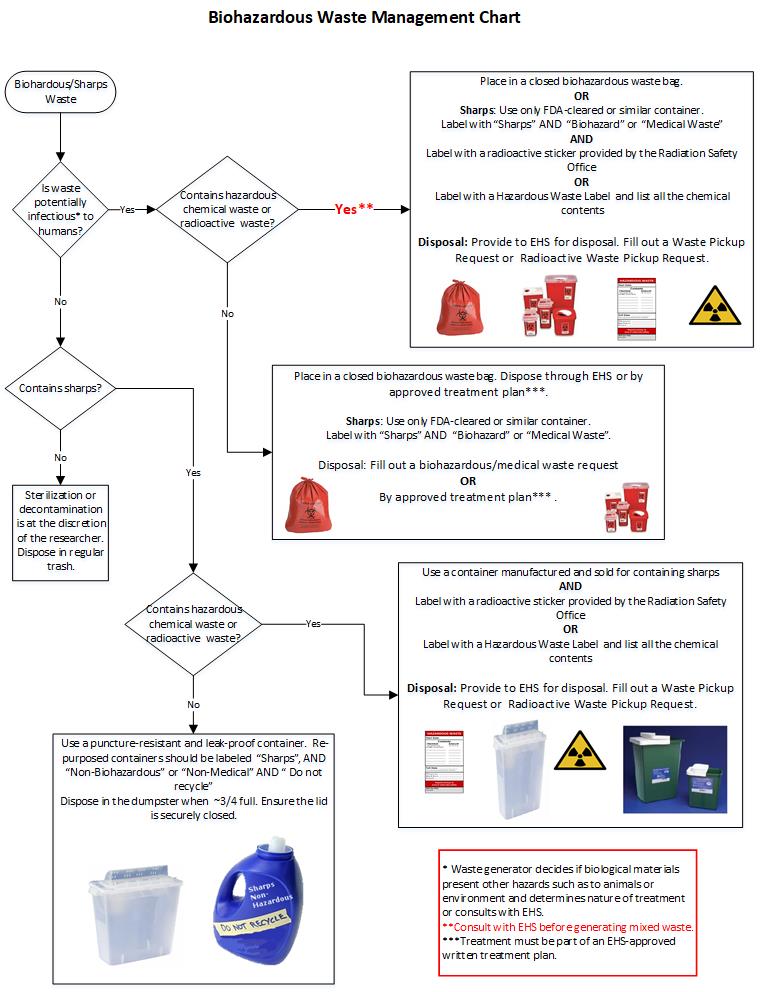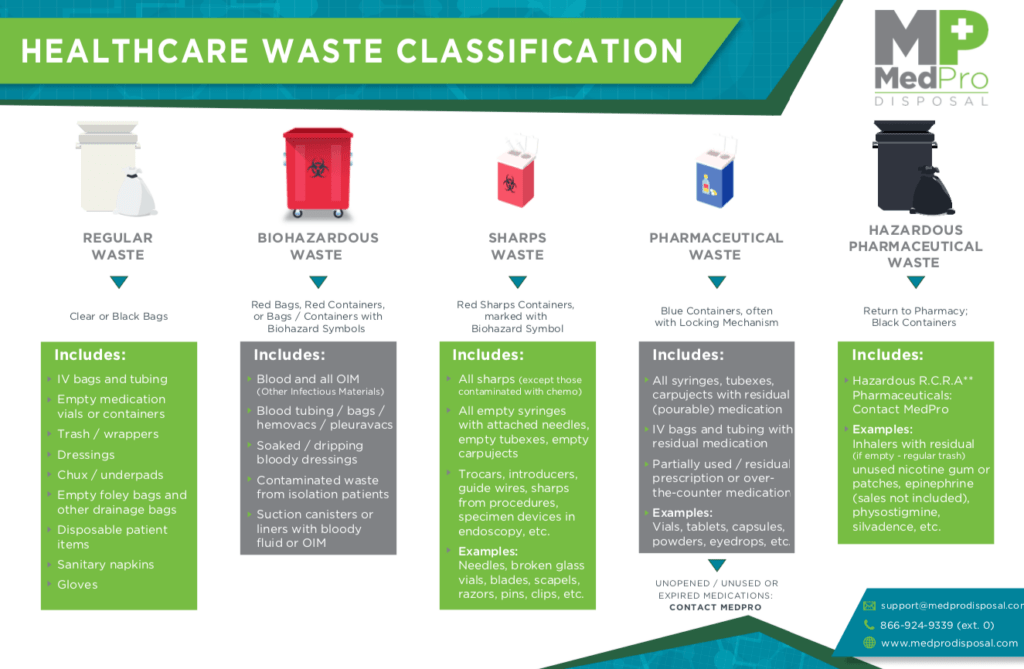Tailored Medical Waste Disposal Service: Meeting Healthcare Compliance Standards
Wiki Article
Correct Disposal Techniques for Medical Waste
Correct disposal techniques for medical waste are of utmost value in ensuring the safety and security of both healthcare workers and the general public. The ideal handling and disposal of medical waste is critical to stop the spread of contagious conditions and the contamination of the setting. This consists of the safe disposal of sharps, contagious waste, and pharmaceutical waste. Sticking to rigorous standards established by governing bodies is vital to keep conformity with lawful laws and protect public wellness. This introduction will explore the importance of appropriate medical waste disposal, offer guidelines for dealing with different kinds of waste, and highlight the need for healthcare centers to adopt ideal techniques. By adhering to these standards, doctor can contribute to a much safer and healthier environment for all.Significance of Proper Medical Waste Disposal
Proper clinical waste disposal is of utmost importance in order to avoid the spread of infections and secure public health and wellness. Medical waste describes any waste created throughout medical treatments or from the healthcare market. This waste can have contagious materials, such as blood or physical liquids, sharps, pharmaceuticals, and various other possibly hazardous materials. If not taken care of effectively, medical waste can posture significant risks to medical care employees, clients, and the basic public.One of the main factors for proper clinical waste disposal is to stop the spread of infections. By securely disposing of clinical waste, the possibilities of exposure to these microorganisms are considerably decreased, making sure the security of healthcare workers, clients, and the community at large.
In addition, proper clinical waste disposal is vital for protecting public wellness. By adhering to correct disposal methods, such as partition, containment, and therapy, we can minimize the prospective threats associated with clinical waste and protect the health of the community.
Handling and Disposing of Sharps
When it pertains to the handling and disposal of sharps, adherence to correct procedures is vital for guaranteeing the security of medical care workers and avoiding the threat of injury or infection. Sharps include needles, syringes, lancets, and other products with the possible to cut the skin or pierce. As a result of their potential to transmit bloodborne virus, such as HIV and hepatitis B and C, it is crucial to get rid of and manage of sharps correctly.
Disposal of sharps containers must follow regional policies and standards. It is best to utilize certified clinical waste disposal services that specialize in the correct handling and disposal of sharps to guarantee conformity with policies and reduce threats to health care employees and the setting.
Guidelines for Transmittable Garbage Disposal
Infectious waste, also known as biomedical or biohazardous waste, refers to products that are possibly contaminated with infectious agents or other dangerous compounds. Appropriate disposal of transmittable waste is essential to guarantee the safety and well-being of healthcare employees, clients, and the general public.The guidelines for contagious waste disposal vary depending upon the country and neighborhood laws, but there are some common techniques that health care facilities ought to follow. All contagious waste ought to be set apart from other types of waste at the point of generation. This helps avoid cross-contamination and makes sure that the waste can be managed properly. Contagious waste ought to be saved in watertight, puncture-resistant containers that are clearly classified with the biohazard icon. When not in usage to reduce the threat of direct exposure, these containers ought to be maintained shut. Infectious waste must be transferred and disposed of by licensed waste administration business that specialize in managing biomedical waste.
It is necessary for healthcare facilities to have thorough training programs in place to enlighten staff on the appropriate treatments for transmittable waste disposal. This consists of training on waste segregation, storage space, and taking care of techniques. By complying with these standards, health care facilities can successfully take care of transmittable waste, lower the risk of infections, and safeguard public health and wellness.
Ideal Practices for Drug Waste Disposal
Drug garbage disposal need to constantly be conducted on a regular basis and according to expert guidelines. Appropriate monitoring of pharmaceutical waste is necessary to safeguard public health and wellness and the atmosphere. Drugs can posture a significant risk if not thrown away properly, as they might infect water resources, injury water life, or also add to the development of antibiotic resistance.Among the most effective techniques for pharmaceutical garbage disposal is to establish an assigned collection system within medical care centers. medical waste disposal. This system ought to include different containers for various kinds of pharmaceutical waste, such as ended drugs, unused drugs, and contaminated products. These containers should be clearly classified and found in easily accessible locations to encourage proper disposal by medical care experts
Additionally, it is important to educate medical care team regarding the proper handling and disposal of pharmaceutical waste. Educating programs ought to focus on recognizing various sorts of pharmaceutical waste, understanding the linked dangers, and following the ideal disposal treatments. Regular suggestions and updates must be provided to make certain compliance with disposal standards.
In addition to inner techniques, WasteX Medical Waste Disposal health care centers should likewise establish collaborations with accredited waste management business. These companies focus on the collection, transport, and disposal of pharmaceutical waste. By functioning with these specialists, healthcare centers can ensure that their pharmaceutical waste is dealt with securely and in conformity with local guidelines.
Conformity With Legal Regulations
In order to guarantee compliance with lawful regulations, it is imperative for health care facilities to abide by correct disposal techniques for clinical waste. Medical waste presents a significant risk to public health and wellness and the atmosphere, making it important for healthcare facilities to dispose and take care of of it according to the regulation.
Regulatory bodies, such as the Occupational Security and Health Management (OSHA) and the Environmental Protection Company (EPA), have actually developed guidelines and demands for the appropriate disposal of clinical waste - WasteX Medical Waste Disposal. These guidelines intend to protect healthcare employees, waste monitoring personnel, and the public from prospective dangers linked with clinical waste

Non-compliance with legal regulations can lead to severe repercussions for health care centers, including fines, legal responsibilities, damages to reputation, and prospective harm to public health. Therefore, it is essential for medical care centers to remain current with the most up to date regulations and continually screen and improve their waste administration methods.
Final Thought
Sticking to guidelines for disposing and taking care of of sharps, infectious waste, and pharmaceutical waste is necessary. It is imperative that medical care centers maintain stringent methods for the correct disposal of clinical waste to lessen threats and maintain a safe health care setting.Clinical waste refers to any waste created throughout clinical procedures or from the health care industry. Transmittable waste, likewise understood as biohazardous or biomedical waste, refers to materials that are potentially contaminated with infectious agents or other harmful materials. All transmittable waste needs to be set apart from various other kinds of waste at the point of generation. Infectious waste should be delivered and disposed of by qualified waste monitoring business that specialize in managing biomedical waste.
Sticking to standards for taking care of and getting rid of of sharps, transmittable waste, and pharmaceutical waste is important. (medical waste disposal)
Report this wiki page